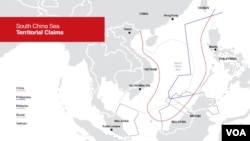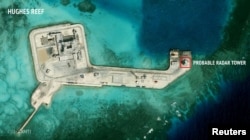An international tribunal in The Hague has rebuked China over its behavior in the South China Sea and found no legal basis for Beijing's vast claims to sovereignty over the waters. The tribunal also criticized China for damaging the environment of coral reefs and for not preventing its fishermen from killing protected species such as sea turtles. Here are the main points from Tuesday's unanimous ruling by the five judge panel:
China has no legal basis for its historic claims to the so-called "nine dash line" which encircles about 90 percent of the South China Sea
-China argues that its fishermen have been fishing in the South China Sea for centuries, but the tribunal found that for much of this time, the waters "were legally part of the high seas, in which vessels from any State could freely navigate and fish." That means that Chinese fishermen were exercising "high seas freedoms... and there was no evidence that China had exercised exclusive control over the waters... or prevent other States from exploiting their resources."
-China's expansive claims under the nine-dash line are incompatible with the allocation of rights under the U.N. Convention on the Law of the Sea, which Beijing ratified. The panel ruled that whatever China's historic rights to resources in the waters of the South China Sea, they "were extinguished" when the country entered into the Convention.
Many features which Beijing claims do not qualify as islands which would give the owner expansive rights over the surrounding waters
-For a land feature to be considered a territory with exclusive rights over surrounding waters, it must remain above water at high tide. The panel noted that while China has carried out extensive land reclamation on many coral reefs, such improvements do not alter the features' legal status, which is based on their "natural condition" before such constructions.
-The panel said it consulted an expert hydrologist and used archival materials to determine that none of the features in the dispute qualify as islands, which would entitle them to a 200 nautical mile exclusive economic zone. However some features including Scarborough Shoal, Johnson Reef, Cuarteron Reef and Fiery Cross Reef are high-tide features, which could generate an entitlement to at least a 12 nautical mile territorial sea.
Rebuke for China's actions in the South China Sea
-The panel ruled that China constructed installations and artificial islands at Mischief Reef without the authorization of the Philippines, violating Manila's sovereign rights.
-The tribunal found that the Philippines has sovereign rights with respect to sea areas in its exclusive economic zone, which includes Mischief Reef, Second Thomas Shoal and Reed Bank. And it found that China had interfered with Philippine petroleum exploration at Reed Bank, and it tried to prohibit Philippine fishermen from operating within Manila's exclusive economic zone at Mischief Reef and Second Thomas Shoal.
-The panel consulted environmental experts to conclude that China's "recent large scale land reclamation and construction of artificial islands at seven features in the Spratly Islands has caused severe harm to the coral reef environment" in violation of Beijing's commitment to protect the marine environment under its obligations to the Convention.
-The panel concluded that Chinese law enforcement vessels also created "serious risk of collision and danger to Philippine ships and personnel" during encounters in the South China Sea, in violation of Beijing's commitment to the Convention.







